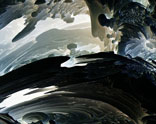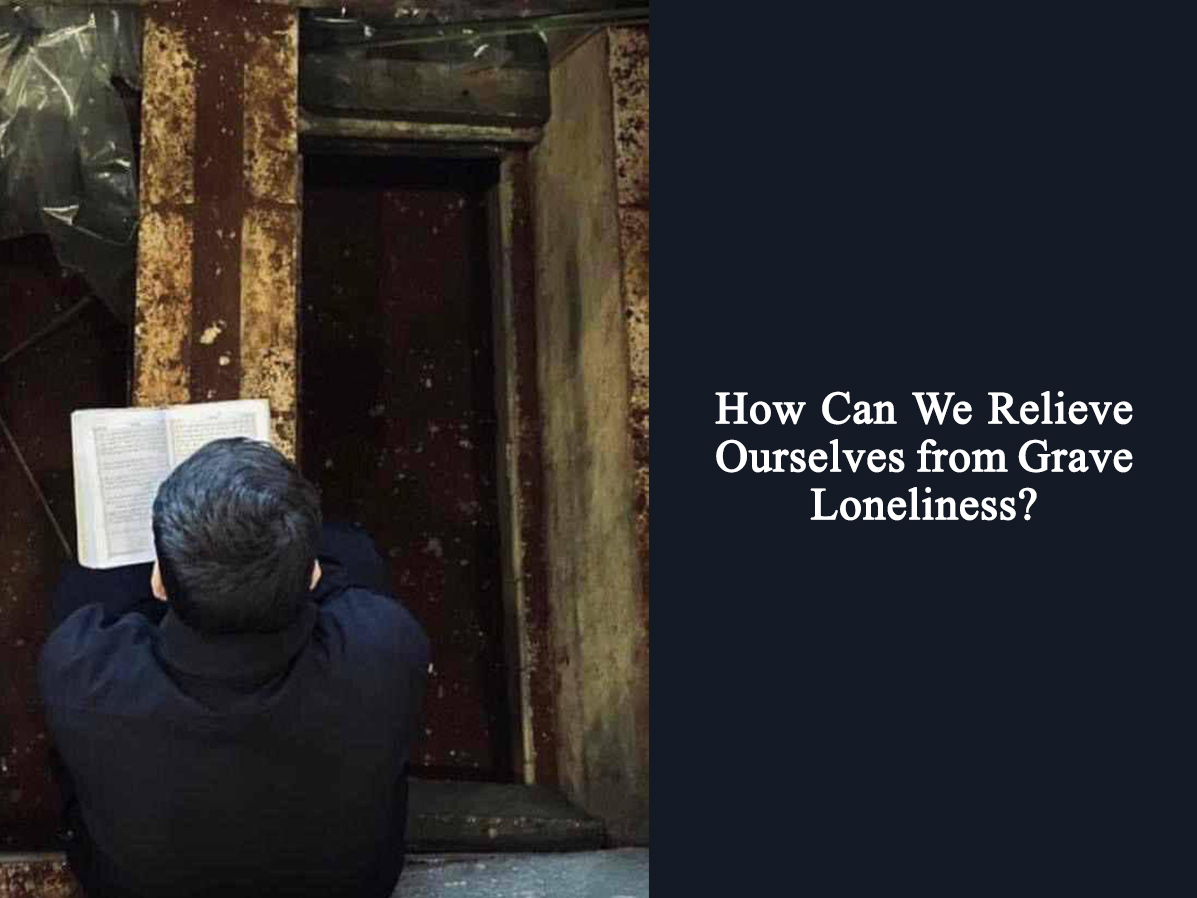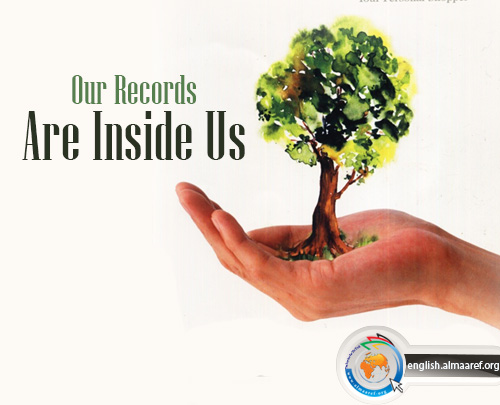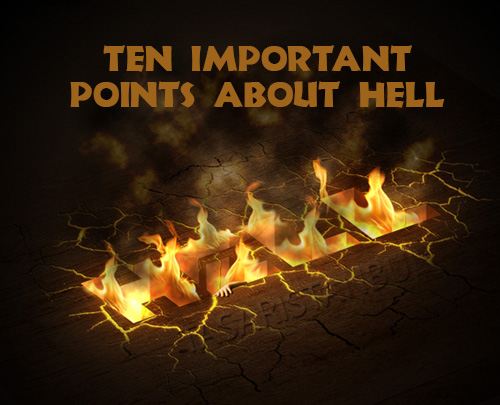The Bridge, Which Passes from the Top of the Hell
Death & Purgatory
Serat' in the grammatical sense means a way or a road, and its meaning according to the Shari'ah is a bridge or a road which passes from the top of hell. In a tradition from Masoom (A.S.) it is stated that `Poole Serat' is a bridge thinner than a hair, sharper than a sword, and hotter than fire (of this world).
The true believers (Mo'meneen) will pass over it speedily like lightning. Some will find some difficulty over it, but will later find relief. While there will be some who will slip and fall down in the pit of hell. The likeness of 'Poole Serat' is of "The Right Path" (Seratal Mustaqeem) of this world, the path of Ali (A.S.) and Aimmah (A.S.)'s obedience.
The person who in this world turned away from the `Seratal Mustaqeem' (The path of Ahlulbayt) in word and deed, and was attracted towards falsehood, on the day of Qayamat he will slip over the Poole Serat and fall into hell. In Surah-al-Hamd, Seratal Mustaqeem' refers to both these paths (The path of Ahlulbayt and Poole Serat ).
Allamah Majlisi in his book `Haqqul Yaqeen' quotes from Shaikh Sadooq that: Our belief concerning Qayamat is that the Passes (Aqabaat) each have a specific name. Some are called Farz (compulsory Acts), others Amr (Commands), yet others Nahy (Prohibitions).
So when a man will reach the Pass of Farz, and he had neglected it (in his life), he will be stopped there and imprisoned for a thousand years, and the dues of Allah will be demanded of him. Now if he goes out of it by means of some good act performed by him in the world, or by the Mercy of Allah, then he escapes from it and goes on to another Pass. He will not cease to be sent from one Pass to another, and be stopped and questioned regarding his shortcomings in respect of each stage.
If he escapes safely from all the Passes, he will arrive at the abode of Permanence (Darul Baqa). Here he comes upon everlasting life, and perpetual beatitude, without any affliction whatsoever. He will reside in the neighborhood of Allah, with the Prophets (A.S.), and the Imam (A.S.), the veracious ones, the Martyrs (Shohada), and the righteous ones from among His slaves. And if he is stopped at a Pass, and is questioned about a certain due in respect of which he is found wanting and neither a good action on his part nor the Mercy of Allah reaches him, his step will stumble and he will be hurled down in the fire of hell. (Al Aqidatul Imamiyah).
Imam Mohammad-al-Baqir (A.S.) says, that when the verse (Ayah) ﴾And hell is made to appear on that day﴿ (Surah-al-Fajr: 23) was revealed, the Holy prophet (peace be upon him and his household) was asked regarding its interpretation. He replied, "Jibreel has informed me that when Allah will have gathered everyone from the beginning to the end on the day of Qayamat, one thousand Angels will bring the hell pulling it with a thousand ropes with great difficulty.
Hell will be roaring and raging with anger and the voice of breaking (of bones) will be heard from it. At that moment a ferocious voice will erupt from it, which Allah has reserved to take the account of people, and every one will perish (with fear). Men, Angels, and the Prophet will be wailing with fright.
Man will cry out, "Our Lord! save me, save me", while the Prophets will cry out, "O Lord! save my people (ummah)". So each Prophet will take account of Their people (ummah) and walk over the Poole Serat. No one will have any escape from walking over it. Allah says in the Qur'an ﴾And there is not one of you but shall come to it, this is an unavoidable decree of your Lord. And we will deliver those who guarded (against evil,) and we will leave the unjust therein on their knees﴿. (Surah-al -Maryam: 71-72)"".
Then the Prophet (peace be upon him and his household) said, "This bridge contains seven Passes (Aqabat), and each Pass has got a station equal to seventy farsakh, and seventy thousand Angels have been positioned on each station. All the people will have to cross these Passes".
1 st. Pass: kindness (Sile Raham), Trust (Amanah), Love of Ahlulbayt (A.S.) (Walayah).
The first station here is of kindness (Sile Rahm). The person who in this world is not merciful towards his parents will have a short life . He will not prosper (in wealth), and in the Hereafter will be stopped on the first station on Poole Serat, and no mercy will be shown towards him. The Holy Qur'an admonishes us in the following words: ﴾And be careful of (your duty to) Allah, by whom you demand one of another (your rights), and to the ties of relationship﴿. (Surah- an- Nisa: 1)
So when one of your relatives is sick, visit him, if he is indigent, help him and fulfill his wants, and visit them (your relatives) on important days (of Idd etc.).
The second station is of Trust (Amanah). Trust does not only include wealth, but also if someone confides in you and tells a secret requesting you not to reveal it to anyone, this too is included in trust. If you disclose it to another, you have committed a breach of trust. If you disgrace someone, you have committed a breach. And also if someone keeps some wealth with you as a trust and even after promising to return it, you refuse to do so, you are said to have committed breach (of trust). The same rule applies for hire. If you borrowed something from someone for a fixed period, after the period having expired you do not return it, it will be deemed as being a violation of trust.
Shaikh Husain bin Sa'eed al Ahwazi relates from Imam Mohammad -al- Baqir (A.S.) that one day someone gave the good news to Abu Zarr that his sons had brought a huge stock of cattle, and that his Property had increased. To which Abu Zarr replied, "The increase of property will not make me happy, nor do I consider it to be a prosperity for I believe in being moderate and little is sufficient for me".
The guarding of this property would have made me busy and negligent (of my duty towards Allah). I have heard the Messenger of Allah (peace be upon him and his household) as saying that, on the day of Qayamat when a person who is trustworthy and kind passes over the poole, Serat' kindness and trust will be on both sides to support him. It is also related that the person who has committed breach of trust or severed relations with his kith and kin, on the day of Qayamat when he will walk over the Poole Serat, none of his deeds will be of any help to him, and he will fall flat into the pit of hell.
The third station is Love of Ahlulbayt (A.S.) (Walayah). Regarding the love of Ahlulbayt (A.S.) Many traditions have been quoted in the Shi'ah as well as Sunni books, that Walayah means the Love of Imam Ali (A.S.). In Tafseer Salabi it is written regarding the verse: ﴾And stop them, for they shall be questioned﴿. (Surah- al-Saffat: 24). It is said that people will be stopped and asked if they accepted the walayah' of Imam Ali (A.S.) in the world and said, "Aliyun Waliyullah", while believing in it. Allamah Huwainee and Tabari both great scholars of the Ahle Sunnat quote the Holy Prophet (peace be upon him and his household) as saying O' Ali! Whoever denies your love will be stopped (from going further) over the poole Serat".
In Sawaeqe Muhriqah it is written that whoever has got the passport of the Love of Ali (A.S.) will pass easily over the Serat. Many other traditions are quoted which cannot be written here due to lack of space.
2nd. pass-Namaz.(Salat)
On this pass a person will be stopped and questioned regarding the five daily prayers, the prayer of Signs (Namaze Ayaat), and elapsed prayers (Namaze Qaza), about which it has been discussed in the chapter of "Accounting" Imam Ja'far- as-Sadiq (A.S.) in his last will said "Whoever considering Namaz to be unimportant (or lowly) will not receive our Intercession (in Qayamat)".
Allah says in the Qur'an, ﴾Woe to the praying ones, who are unmindful of their prayers﴿. (Surah- Al Ma'un: 4-5). The person who does not offer Namaz dies thirsty, and will also arise thirsty from his grave. People should themselves recite Namaz and advise others to do so. We should adapt our children to offer Namaz before they reach puberty, because parents of a child reciting Namaz to get a share in their rewards.
Parents who advise their children (while they are still young) to do good deeds and their children in turn follow them, such parents receive the reward thereof. And after a child reaches puberty the good deeds are recorded in his own scrolls.
Once a Prophet was passing near a grave with his companions, when suddenly he told them to pass away quickly for the person in the grave was being chastised by Allah's wrath. One year later when he passed by that same grave, he sensed that the wrath of Allah had been lifted up from the grave. He was astonished and asked Allah the reason for it. Allah replied, "This person had left behind him a child who was sent to school, his teacher taught him to recite "Bismillahir Rahmanir Raheem". Thus when his child addressed Me as being a Beneficent and Merciful Lord, I forgave his parents, for they have been a medium for his birth. I felt ashamed that in spite of their child addressing me thus, I should punish them".
"O' you who believe! save yourselves and your families from a fire whose fuel is men and stones". (Surah- at Tahreem: 6) Then we should warn our relatives and friends (from the wrath of Allah) by enjoining good (Amr bil Ma'roof) and forbidding evil (Nahy anil Munkar).
3rd .Pass --zakat.
If a person in his life has not paid zakat or khums due on him (even equal to a dirham) to the deserving persons will be stopped at this pass. The Holy Prophet (peace be upon him and his household) says that on the day of Qayamat, the non-payer of zakat' will be in a state that a python (called Aqra) will be wound around his neck. (Aqra is the name of a python, the hairs of whose body have fallen off due to intense poison in it).
In another tradition it is stated that if a person does not pay Khums' due on his agricultural field, on his neck will be placed a chain of the seven worlds on the day of Qayamat. It is also related that when Imam- al- Mahdi (May Allah hasten his appearance) reappears, He shall put to death those who do not pay zakat due on them. The person hoards large provisions of gold and silver (will zakat due on them), on the day of Qayamat these dirhams and dinars will be made red hot in fire and will be placed on their foreheads and their sides.
As said in the Qur'an, ﴾on the day when it shall be heated in the fire of hell, then their foreheads and their sides and their backs shall be branded with it, this is what you hoarded up for yourselves, therefore taste what you hoarded﴿. (Surah- al - Bara'at: 35) There is no difference between the Zakat of wealth and the Zakat of body (Fitrah).
Many harsh words have been used regarding the non-payment of khums’, and many traditions are found regarding it. One tradition needs to be quoted here from Usul Al kafi’ that Al Imam Ja'far- as-Sadiq (A.S.) says that on the day of Qayamat the most difficult time will be when the deserving person of khums will catch hold of the end of the shirt of the one who did not pay it. They will ask for their rights from them on this pass, and will not allow him to move further until he gives them their due rights. But the situation will become even worse when the Interceders (Ahlulbait) themselves will ask for Their Rights (khums) from people.
4tn. Pass-Fasting (Saum).
On the fourth pass people will be questioned regarding fasting. If a person has been fasting in this world, only then shall he be permitted to pass over it easily, otherwise he shall be stopped there. The Holy Prophet (peace be upon him and his household) has said, "Fasts act as a shield against the flames of the fire of hell". The Holy Prophet (peace be upon him and his household) has said, ﴾For the one who fasts there are two good tidings for him, one at the time of breaking the fast (Iftaar), while the second when he shall meet his Lord. He will then pass over the Poole Serat easily and enter the presence of his Almighty﴿.
5th .Pass-pilgrimage (Haj)
If the performance of Hajj becomes obligatory (wajib) on a person in his life- time, and he does not perform it, then he shall be stopped at this pass. It is stated that during death it will be said unto him "You have died the death of a Jew or a Christian. You are not associated with Islam". It is said in the Qur'an, ﴾And pilgrimage to the House is incumbent upon men for the sake of Allah, (upon) everyone who is able to undertake the journey to it, and whoever disbelieves, then surely Allah is Self-sufficient, above any need of the world﴿. (Surah-al-Aale Imraan: 96)
6th . pass-Cleanliness (Taharah).
According to Ibne Abbas purification (Taharah) is of three types Ablution (Wuzu'), Bath (Ghusl), and Tayammum, while others consider it to be absolute purification (of the body as well as the soul). If a person does not take care of cleanliness (or purification), especially those men and women who do not perform the ceremonial bath (Ghusle Janabat) correctly or on its prescribed time, shall be stopped at this pass. Women should also take care about the performance of other baths (viz. Ghusl Haiz, Nifaas, lztahaza etc.), and not be negligent about it as is the custom amongst. ignorant people. It is related that a person who does not keep himself away from impurities, will face the squeeze in the grave (as has been discussed in the chapter of “Grave”).
7 th .pass-Rights (Mazalim).
Mazalim is sometimes interpreted as justice while sometimes it refers to the rights of others. The Holy Qur'an says about this pass: ﴾Most surely your Lord is watching﴿. (Surah-al-Fajr: 14) In interpretation of this verse Lord says that some people will be passing over the poole Serat in a manner that they will be clasping it by their hands. Others will be walking in a manner that one leg of theirs will be slipping and they will be taking help of their second leg, while the Angels will be standing on both sides. People will be falling into the fire of hell like bats (falling on the ground). The person who is fortunate to get the Mercy and Blessings of Allah will pass over the poole Serat easily and will say, "All praise be to Allah, for verily He has completed my good deeds with His Mercy and Blessings and increased my reward.
I thank Him that He with His Beneficence and kindness gave me freedom, when I had lost all hope". Without doubt Allah is the forgiver of sins of His servants and the reward of their good deeds. If a person has troubled someone with no fault of his, he will be imprisoned for five hundred years on this pass so much so that his bones will break.
If a person has usurped someone's wealth, he will be imprisoned for forty years on this pass and then he shall be thrown into the fire of hell. In traditions it is narrated that in exchange for one (usurped) dirham, seven thousand (accepted) prayers of the usurper will be given to the person whose dirham he acquired. (It has already been discussed in detail in the chapter of Accounting).
Incident
Allamah Bahauddin Sayyed Ali bin Abdul karim Neeli Najafi (whatever praise of his is done will be quite less, who was the student of Shaikh Shaheed), in his book Anwarul Maziyyah (written in praise of Imam Ali) narrates an incident from his father who says that: In Neela (a village in Abaee) there lived a person who was the superintendent of the Mosque.
One day he did not come out of his house, when people called him he excused himself. People inquired about it and they found out that his entire body was charred except his thighs, and he was groaning with pain and sorrow. When people asked him how he burnt himself he replied that, "I dreamt that Qayamat has dawned, and people are in anguish because the majority of them have been thrown into hell, while a small minority was going towards paradise.
I was among those who were going towards paradise. Suddenly I reached a large and lengthy bridge which was referred to as Poole Serat.’ I started walking on it, and as I walked its breadth became narrow and its length increased until I reached a place where it turned sharper than a sword. Beneath was a large valley full of black and roaring fire whose flames were spurting out like large mountain peaks. Some people walked away easily while some slipped and fell down. And I was so scared that I had no other wish except to cross the bridge rapidly. Suddenly I reached that place where I could no longer control myself and I fell head- long into the pit of the blazing fire.
Its pit had no end and the fire pulled me down. I could not even scream and my mind went blank, and I reached down equal to the distance of seventy years. Suddenly I was inspired and I called out "O Ali ibne Abi Talib! O Amirul Mo'meneen! help me my Lord ''. At that moment I saw a person standing on the edge of the valley. I recognized him to be no other than my Master Ali (A.S.).
I called out to Him and He commanded me to extend my hand. I did so and He pulled me out of the blazing fire. Then He (A.S.) started extinguishing the fire from my thighs with His blessed hands. I suddenly woke up from my dream and found that my whole body was burnt, except my thighs where my Master had laid His hands". This person treated his wounds for three months and was cured. Now whenever I relate this incident to anyone, he develops fever (due to fear), while only some remain un-effected.
Those A'mal which Prove helpful to pass over the poole Sirat easily.
1- Sayyed bin Tawoos in his book Iqbal relates that whoever recites twenty units (Rak'at) of prayers after Namaze Maghrib on the night of the first of Rajab, such that in each Rakat after Surah Al Hamd recites once Surah-al-Tawheed, then he and his family will be saved from the punishment in the grave, and will cross the poole Serat like lightening without any accounting.
2- It is related that whoever fasts for six days in the month of Rajab will find peace in Qayamat, and will walk over the poole Serat easily without being accounted for.
3- It is related that a person who recites ten units of Namaz on the night of twenty ninth Sha'ban, such that in each unit after Surah-al-Hamd recites ten times Surah-at-Takasur, Surah-an-Naas, Surah-al -Falaq, Surah-al-kaferoon, and Surah-at-Tawheed each, Allah will give him reward equal to theologians, and will increase his good deeds, will ease his accounting, and he will cross the poole Serat like lightning.
4- As discussed in the earlier chapter, whoever goes for pilgrimage to the shrine of Imam Ali-ar-Reza (A.S.), Imam (A.S.) Himself comes for his rescue (in Qayamat) at three different places and saves him from the terrors of that day one of which is the Bridge of Serat’.
* Author: By: Shaykh Abbas Qummi. Source: Manazilul Akhirah.




















